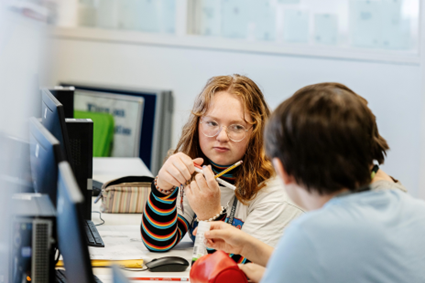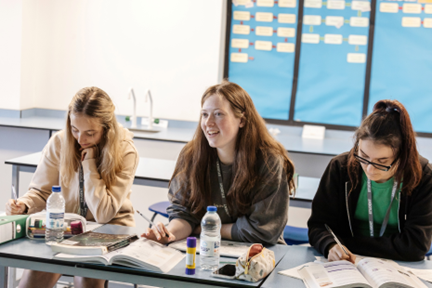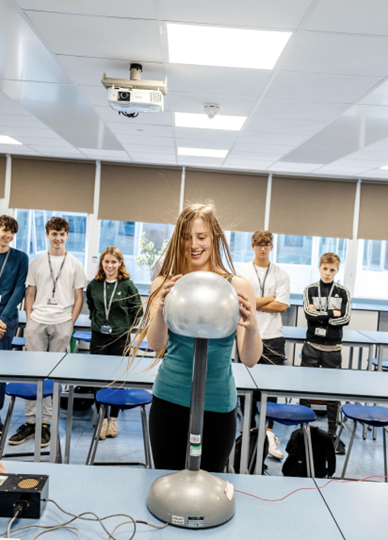BTEC Courses
Business Studies
Outline of Subject:
Business is a relevant and wide-ranging subject which offers an insight into the theory of organisations whilst broadening your knowledge and understanding of the wider world. The Cambridge Technical in Business has been developed in collaboration with experts spanning the breadth of the business sector and Higher Education. It focusses on the skills, knowledge and understanding that today’s universities and employers demand. Students will practically apply their skills and knowledge in preparation for further study or the workplace.
Students will study five units over the two-year course: two of which will be assessed by an external exam and three will be assessed by internal pieces of coursework.
How you will be assessed:
Unit 1 - The Business Environment – Externally assessed unit (approx. 33%) In this unit, students will develop an understanding of how and why businesses operate in the way they do.
Unit 2 - Working in Business – Externally assessed unit (approx. 17%)
Unit 4 - Customers and Communication – Internally assessed unit (approx. 17%)
Unit 5 - Marketing and Market Research – Internally assessed unit (approx. 17%)
Unit 8 - Introduction to Human Resources – Internally assessed unit (approx. 17%)
Trips and Work Experience Opportunities:
In recent years, we have visited many local businesses.
Possible Career Routes:
- Accounting and finance
- Marketing
- Human Resources
- Operation management
- Business management
- Entrepreneur

Criminology
Outline of Subject:
Students learn about the psychological and sociological theories of crime, how crime is perceived in society, and the impact of the media and crime statistics. They also investigate the techniques used in criminal investigations, such as forensics, policing, and the judiciary process.
This qualification is designed to support learners progressing to university. It can help students access higher education degree courses such as BSc Criminology, BA Criminology, and LLB (Hons) Law with Criminology.
Students should be interested in people, society, and crime, be able to work under pressure, and be innovative and motivated.
Students can expect regular homework and assignments, and to make presentations to the class and work in groups.
How you will be assessed:
The WJEC Level 3 Applied Diploma in Criminology is assessed using a combination of internal and external assessment.
The following units will be externally assessed:
Unit 2: Criminological Theories
Unit 4: Crime and Punishment
The following units are internally assessed:
Unit 1: Changing Awareness of Crime
Unit 3: Crime Scene to Courtroom
Possible Career Routes:
- Police officer
- Probation officer
- Crime scene investigator
- Private investigator
- Social worker
- Youth worker
- Detective

Food Science and Nutrition
Outline of Subject:
An understanding of food science and nutrition is relevant to many industries and job roles. Care providers and nutritionists in hospitals use this knowledge, as do sports coaches and fitness instructors. Hotels and restaurants, food manufacturers and government agencies also use this understanding to develop menus, food products and policies that support healthy eating initiatives. Many employment opportunities within the field of food science and nutrition are available to learners .
You will build on and extend your practical food preparation skills and also, each unit within the qualification has an applied purpose which acts as a focus for the learning in the unit. The applied purpose demands authentic work-related learning in each of the available units. It also requires you to consider how the use and application of your learning impacts on yourself, other individuals, employers, society and the environment.
How you will be assessed:
The WJEC Level 3 Diploma in Food Science and Nutrition is assessed using a combination of internal and external assessment.
Unit 1 and Unit 2 are assessed through external assessments (examinations). Unit 1 is usually sat at the end of year 12 (with resit in year 13 if needed) and Unit 2 is sat between May 1st – June 1st in year 13. Unit 3 is assessed internally: you will need to respond to a set assignment brief at any time within the academic year, which will be marked by your teacher and moderated by WJEC.
Trips and Work Experience Opportunities:
Links with Sheffield Hallam Food and Nutrition tutors including visit to see their facilities.
Possible Career Routes:
- Food and Nutrition
- Human Nutrition
- Public Health Nutrition
- Food Science and Technology
- Sports sciences
- Catering
- Food manufacturing and preparation
- Retail
- Tourism

Medical Sciences
Outline of Subject:
Medical Science? The Level 3 Applied Certificate/Diploma in Medical Science is about how we maintain health and the prevention and treatment of diseases. Medical scientists are at the forefront of healthcare services, as they are vital in the diagnosis of disease, determining the effectiveness of treatments and searching for new cures. These qualifications provide learners with the knowledge, understanding and skills in key scientific principles to support progress to higher education or employment in areas of medical science.
How you will be assessed:
Units 1, 2 and 3 are common with the Level 3 Certificate in Medical Science. Unit 1 is an exam which makes up 25% of the diploma qualification. Unit 2 is a non-exam assessment task which makes up 12.5% of the diploma qualification. This is marked by your teacher. Unit 3 is a non-exam assessment task which makes up 12.5% of the diploma qualification. This is marked by your teacher. Unit 4 is a non-exam assessment task which makes up 25% of the diploma qualification. This is marked by your teacher. Unit 5 is a non-exam assessment task which makes up 12.5% of the diploma qualification. This is marked by WJEC. Unit 6 is an exam which is internally assessed.
Trips and Work Experience Opportunities:
NHS work placement in July of Y12 for 1 week.
Trip to Yorkshire wildlife park.
Thackery Museum of medicine in Leeds.
Huddersfield university to experience university life and working in a laboratory setting.
Possible Career Routes:
A range of job roles within health care, life sciences, laboratory and scientific tests to support the diagnosis and treatment of disease, physiological sciences, working directly with patients.
A significant proportion of career opportunities in this sector are at degree level. When supported by other appropriate qualifications. The Level 3 Applied Certificate/Diploma in Medical Science will enable progression to higher education to a range of Applied Science programmes, such as biomedical science, life sciences, and physiology.

Music Performance
Outline of Subject:
BTEC Level 3 National Extended Certificate in Music Performance is equivalent to one A Level and is largely focussed on performance. It is a heavily practical course which also builds upon knowledge gained at GCSE and provides a deeper understanding of the music industry.
Across the units of the course, you will be able to analyse the process of creating music and events, from performance to marketing, as well as studying the music industry. At the end of the course, you will be much more than a performer. You will be someone with a rich understanding of how music and the music industry work.
Shelley College is proud to offer small class sizes, which maximises the teacher support you will get throughout the course.
Whilst studying BTEC Music, several of our students take part in musical enrichment activities which provide students with additional skills and experience to their qualifications.
How you will be assessed:
Unit 1: Practical Music Theory and Harmony.
Developing your understanding and knowledge of notation and composition.
Unit 2: Professional Practice in the Music Industry
In this unit you will learn how to create event bids
Unit 3: Ensemble Performance
Essential skills for being a musician, from rehearsal techniques to performance.
Unit 6: Solo Performance.
In this unit you will develop as a solo artist.
Trips and Work Experience Opportunities:
Leeds Conservatoire
BIMM
Theatre visits
The Bridgewater Hall
Workshops with professional musicians
Possible Career Routes:
- Musician
- Record Producer
- Sound Designer
- Tour Manager
- Music Publicist
- Music Journalist
- Music Therapist
- Songwriter
- Promoter
- Music Production
- Booking Agent
- Music Teacher

Sport and Physical Activity
Outline of Subject:
The course provides a specialist programme of study that provides students with the skills, knowledge and understanding required within the sports sector to progress to the next stage of their lives, whether that’s higher education, an apprenticeship or employment.
Students study a wide range of centre assessed units as well as three examined units on the body systems and the long- and short-term impacts of sport and physical activity; how sport is organised and the purpose of sports development; health and safety requirements in sport and physical activity.
The centre assessed units studied are:
- Body systems and the effects of physical activity
- Sports coaching and leadership
- Sports organisation and development
- Working safely in sport, exercise, health & leisure
- Organisation of sports events
- Performance analysis in sport and exercise
- Physical activity for specific groups
- Health and fitness testing
- Sports injuries and rehabilitation
- Practical skills in sport and physical activity
- Sport and exercise psychology
How you will be assessed:
Students will complete 8 centre assessed units and 3 examined units. At the start of each centre assessed unit, students are given their assessment tasks and the dates for completion. Work is graded according to the grading criteria: pass, merit and distinction. Points are awarded to the assignment, and these are totalled to provide a final overall grade.
Trips and Work Experience Opportunities:
Students engage in meaningful employer involvement from various local and national sporting businesses and organisations, such as physiotherapists and fitness instructors.
They attend trips to universities and national sporting institutions such as the English Institute of Sport.
They are also given the opportunity to engage in additional qualifications such as first aid at work.
Possible Career Routes:
- Teaching
- Fitness instructor
- Physiotherapist
- Sporting facilities manager
- Sports coach
- Sports nutrition
- Sports development
Health and Social Care
Outline of Subject:
This qualification is for students who are interested in learning about the health and social care sector alongside other fields of study, with a view to progressing to a wide range of higher education courses. It is designed to be taken as part of a programme of study that includes A Levels.
Health and Social Care describes the work sectors that provide healthcare and social care services. The topics include human lifespan development, working practices in health and social care, human biology and health.
Health and Social Care as a subject of study is multidisciplinary in nature. It includes concepts and knowledge from natural sciences such as biology and social sciences such as sociology and psychology. This gives Health and Social Care broad appeal and something for everyone to enjoy. It is a fascinating subject, focused on understanding how people live, grow and develop and the factors that affect this.
How you will be assessed:
There are four units of work of equal weighting. Units 1 and 2 are assessed by an external examination.
Unit 3 and the optional unit are assessed internally by an exam board set coursework.
Possible Career Routes:
- Working in health and social care
- Meeting individual care and support needs
- Public health
- Nutrition
- Caring for individuals with dementia
- Healthcare Assistant
- Maternity Care Assistant
- Care/ Support Worker
- Criminology
- Youth Justice


